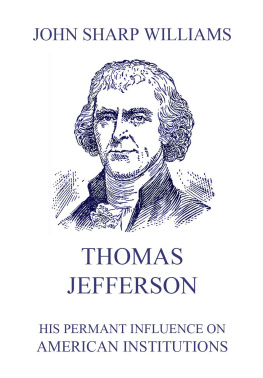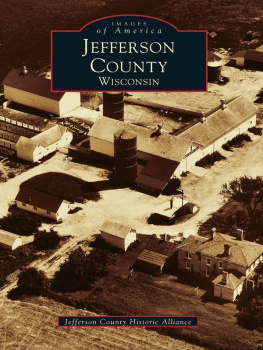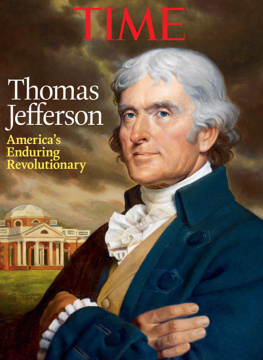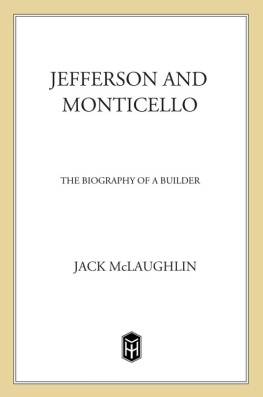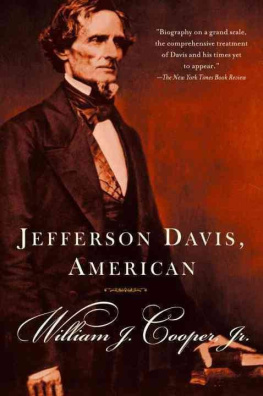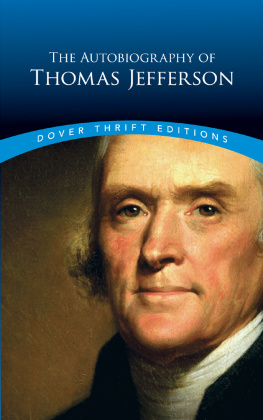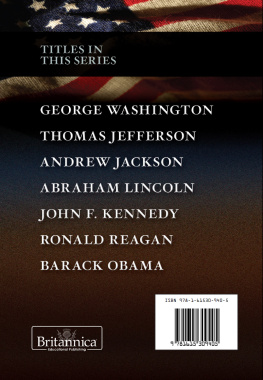CHAPTER I - INTRODUCTORY
In an article written by Andrew D. White, entitled, " Jefferson and Slavery," in the Atlantic Monthly for January, 1862, he says that "in the architecture" of our democratic republic, we find "the agency mainly of six men."
First, three men who "did most to found the Republic: and these three men are Washington, Adams and Jefferson."
" Secondly, two men who "... " did most to build the Republic: and these two men are Jefferson and Hamilton."
" Third, three men, who, having a clear theory in their heads, and a deep conviction in their hearts... did most to brace the Republic: and these three men are Franklin, Jefferson and Channing."
He continues:
"So, rising above the dust raised in our old quarrels, and taking a broad view of this Democracy, we see Jefferson placed firmly in each of these groups.
"If we search in Jefferson's writings and in the contemporary records to ascertain what that power was which won him these positions, we find that it was no personal skill in cajoling friends or scaring enemies....
"The real secret of his power was, first of all, that Jefferson saw infinitely deeper into the principles of the rising democracy, and infinitely farther into its future working, than any other man of his time. Those who earnestly read him will often halt astounded at proofs of a foresight in him almost miraculous."
The subject prescribed for me in these lectures is the permanent influence of Thomas Jefferson on American institutions. Who can say, with assurance, what feature in a nation's institutions is permanent, until its life has been lived out to its end? To delineate the birth principles of the American confederation is easy, but to tell how far these birth principles are permanently life principles, is not so. What Solon said to Croesus applies. What features seemingly essential to our institutions at any one particular time, are really so, is a question whose answer is colored by the time at which the question is asked. If such a question had been asked during and immediately after the Revolution, when the love of freedom was at high tide, the answer would have been one thing; if after Shay's Rebellion in Massachusetts and the general anarchic condition, leading to a great and general reaction against the principles of the American Revolution, it would have been another. If asked once more, after four years of Jefferson's administration had allayed the fear of democracy and of popular rule, the reply would have been still different. Then put yourselves back in the period of 1850-60, and again to the year 1866, and yet again to 1876, and get a different reply in each case.
Imagine the question asked and answered during reconstruction days, and again later on after sensible men had concluded with Tourgee, who called himself "One of the Fools," that reconstruction had been "A Fool's Errand." Again how essentially different the replies would be before and after we had "gone a world-powering" in the Philippines; before, when all were agreed that we wanted no entanglements with the old world by interference, or possession; that we desired only "friendly commerce with all and entangling alliances with none," and after, when we stood amazed to find that somehow we had sillily drifted into becoming an Asiatic power, with Asiatic territorial and political interests and anxieties.
Not knowing what all this has made pregnant in the womb of the future, which of us can assert that any particular feature of our system now deemed fundamental, characteristic, permanent, shall be so ten years from now whether, in any particular case, "having the wolf by the ears," we shall or shall not, or can or can not, "turn him loose"? All of which concludes in this; that for the purpose of the inquiry of these lectures, that is permanent which the inquirer in his horoscoping deems permanent, and, as the wish is so much the father of the thought, it will be largely that which he wishes and prays and hopes is so.
Next, in determining the scope of our work in these lectures: what are the "institutions" of a people? Are they simply constitutional forms? If so, these United States and Mexico and the Central American republics have the same institutions; and England and Italy and Germany, all being "limited monarchies" with so-called responsible parliamentary ministries," have the same institutions. Can either of these statements be true? No. Why not? Because just as a man has an outward body and an inner informing and directing soul, so a nation has a body-politic, about which we hear so much, and a soul-politic, about which we hear little, or nothing, under that name. L' Esprit des Lois the spirit of the institution that is, the thing vitalizing the words of constitutions and statutes must be taken into consideration. Buckle's unfinished political novum organum his " History of Civilization" is only a historical analysis of the evolutionary development of the soul-politic of the peoples.
All considered, I shall then treat the subject in this full sense, and I shall exhibit the permanent, or thought-to-be-permanent, influence of Mr. Jefferson, not only on American visible institutions, but on American vitalizing thought and practice.
But again, how can one tell a man's political influence, without knowing at least enough of his heredity and environment to explain his words, theories, and acts in the light of them?
No man can escape altogether the impress of the form and color of his time and place, nor altogether ignore the blood which courses in his veins. Yet for all this, I shall have neither time nor space. The man, Jefferson, in his lovableness of disposition, his feminine cleanness of speech and thought and life, his almost infinite versatility, his noble optimism, his world-vision, I would literally love to describe. But all that I must ruthlessly forego, save for a sidelight here and there, while correcting some errors of others.
What was his environment? First, he was a Virginian and a planter. Secondly, he was a frontiersman, because Albemarle County, when he was growing up, was still a frontier country. The county settled very rapidly, but still, during the formative period of Thomas Jefferson's life, his environment was a frontier environment. The life he lived later was that of an independent country gentleman. Thus from both sources individuality was the first and necessary product of his life and of the lives of those about him; its chief and indispensable lesson being a reliance on one's own intellect, initiative, and resources; from which proceeded an absolute contempt for authority and precedent merely as such.
Much has been said about Jefferson's being influenced by Rousseau's "Contrat Social." The idea of a social contract being at the base of government a compact of the people amongst themselves was ingrained in his thought and in the thought of all those around him, but it was not from reading. Jefferson never read Rousseau until long after his own political opinions had been formed. Indeed if he read him at all, I can find no trace of it. On the frontier people got this idea of government resting on compact because it was a fact of their fives. First one settler, then half a dozen, then a score would move into a neighborhood beyond the support of old settlements, and then naturally the neighbors would someday gather, and after they had chatted about the crops, about getting a teacher if they could, and about a place for the itinerant preacher to "hold forth" when he came, they would take up the question of the establishment of a practical local government; the selection of somebody before whom neighborhood differences should be argued and by whom they should be settled by analogy of English law, a " justice of the peace" the selection of somebody who should pursue horse thieves, or other criminals, arrest and bring them in for trial by analogy of English law, a " constable" the selection of somebody to correspond with the legislature to secure the organization of a new county, so that they might have a local board to lay out roads, designate ferries, etc., and so that they might have representation in the State legislative body; but preceding all, where and how and under what leadership they should meet for defense against the Indians, when needful. All of these things were done in America in each neighborhood, by a " compact" of the people with one another. This each frontiersman's son learned, with his other A B Cs, on his father's knee, as a part of the usual political experience of the American people.

